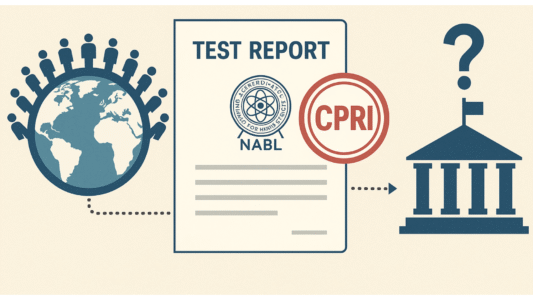Author: PPD Team Date: 24/06/2025

In recent years, some overseas utilities resisted accepting test certificates issued by the Central Power Research Institute (CPRI), India’s premier agency for electrical equipment testing. While many international utilities accept reports from CPRI, a few raised concerns over global recognition and traceability. To understand the issue, it is essential to examine how accreditation works and how CPRI fits into the global compliance system.
The role of accreditation in global acceptance
Accreditation confirms a laboratory’s competence through formal evaluation by a recognised authority. It ensures that the laboratory’s procedures follow international standards, guaranteeing test reliability and impartiality.
In India, the National Accreditation Board for Testing and Calibration Laboratories (NABL) accredits labs under ISO/IEC 17025:2017. NABL is a signatory to Mutual Recognition Arrangements (MRAs) under the International Laboratory Accreditation Cooperation (ILAC) and the Asia Pacific Laboratory Accreditation Cooperation (APLAC). This enables test reports from NABL-accredited Indian labs to be accepted in other member countries. However, some international buyers do not always recognise this equivalence or prefer local certification bodies, creating challenges for reports issued by CPRI.
CPRI’s credentials and international standing
CPRI is an autonomous body under the Ministry of Power and operates independently of manufacturers and utilities. With over six decades of experience, it has built a strong reputation for impartiality.
Its laboratories in Bangalore, Bhopal, and Hyderabad are ISO/IEC 17025-accredited by NABL. Through NABL’s ILAC and APLAC arrangements, CPRI’s reports hold global recognition. CPRI is also a full member of the Short-Circuit Testing Liaison (STL), along with global institutions such as KEMA and CESI. STL membership ensures alignment of test reports with international formats and norms.
Challenges and misconceptions
Despite these credentials, some foreign utilities rejected CPRI reports due to limited awareness of its international affiliations. For example, although CPRI is recognised by Bahrain’s Electricity and Water Authority (EWA) and accredited by INMETRO, Brazil, this was not always known to procurement teams.
As a result, some CPRI clients encountered difficulties in having their equipment accepted in overseas markets. This led industry stakeholders to seek government assistance.
Government and diplomatic solutions
In 2023, the Indian Electrical and Electronics Manufacturers Association (IEEMA) raised the matter with the Ministry of Power. The Ministry worked with the Ministry of External Affairs and the Department of Commerce to engage foreign utilities on the issue.
Indian embassies and trade missions in countries including Thailand, Bangladesh, Bahrain, Ghana, and the UAE advocated for recognition of CPRI’s test certificates. These interventions helped resolve misunderstandings. No new cases of non-acceptance have since been reported. CPRI continues to serve clients in Malaysia, Thailand, Ghana, Bangladesh, Sri Lanka, Nepal, New Zealand, Oman, UAE, Bahrain, and Egypt.
Benefits of CPRI-certified reports
CPRI’s test reports are valid across ILAC and APLAC signatory countries. Reports bearing the NABL logo are traceable and trusted in procurement processes.
Type Test Certificates from CPRI indicate that the equipment has passed all tests under the relevant standards. These certificates are often required by buyers to meet utility specifications, reduce risk, and ensure long-term performance.
CPRI’s STL membership also adds value, as STL-aligned test reports are considered standardised and dependable. This reduces the need for repeated testing in multiple countries.
Beyond testing: CPRI’s wider contributions
CPRI plays a broader role in India’s power sector. It supports the smart meter ecosystem through testing aligned to IEC 62056 and Indian Companion Specifications such as IS 15959 and IS 16444. It is a member of DLMS-UA and issues reports bearing the DLMS logo.
The institute also provides consultancy in areas like power quality, protection coordination, condition monitoring, and renewable integration. Its R&D programmes have completed over 400 projects, secured 70 patents, and produced several technical publications. It also runs technical training programmes to support sector skill development.
Policy initiatives to boost global recognition
To enhance the credibility of Indian certifications, the Government of India has introduced initiatives under Atmanirbhar Bharat. These include:
Public Procurement Order favouring Indian-made boilers and steam generators
Production Linked Incentive (PLI) schemes for electronics, specialty steel (including CRGO steel), solar PV modules, and advanced chemistry cells
SPECS for electronics component manufacturing
Relaxed FDI rules and tariff reforms for electronics manufacturing
Export promotion schemes such as MAI, TIES, and the establishment of Export Facilitation Centres
These policies aim to reduce import reliance, encourage exports, and strengthen international confidence in Indian products and their certification.
Conclusion
Looking ahead, CPRI’s role extends beyond testing to shaping a resilient, innovative power sector. Its expertise in smart metering, renewable integration, and R&D positions it as a cornerstone of India’s Atmanirbhar Bharat vision. For manufacturers, utilities, and regulators worldwide, choosing CPRI-certified equipment ensures reliability, compliance, and trust. Stakeholders should verify CPRI’s credentials and leverage India’s trade networks to unlock seamless international opportunities, solidifying CPRI’s status as a global leader in electrical certification.
